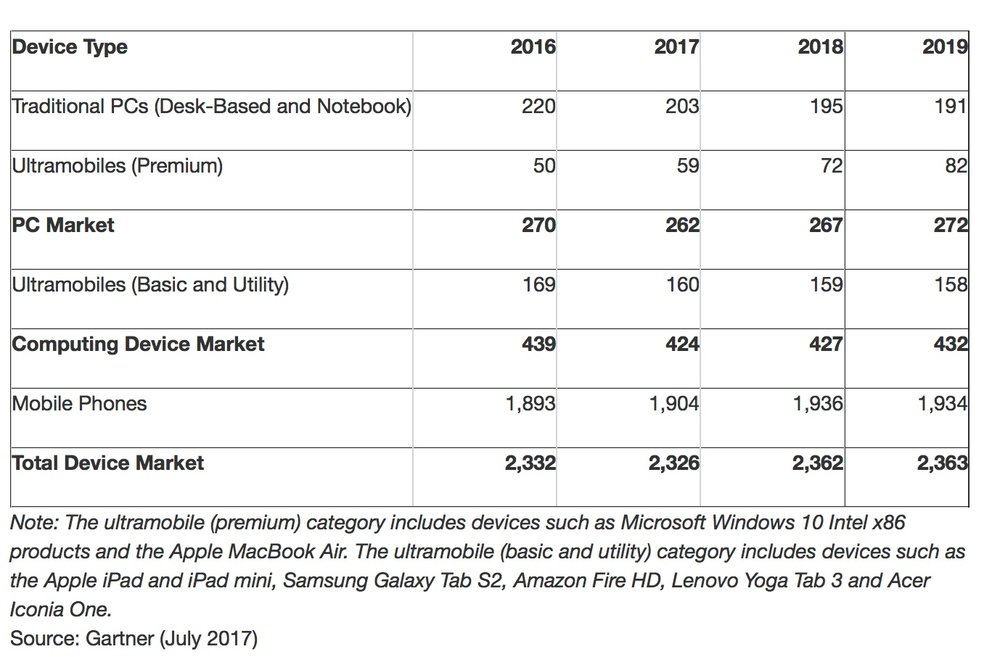Worldwide shipments of personal computers (PCs), tablets and smartphones are expected to exceed 2.3 billion units in 2017, a decline of 0.3% from 2016, according to Gartner, Inc. The market is forecast to return to growth in 2018 with a 1.6% increase in shipments, according to the research group.
“Overall, the shipment growth of the device market is steady for the first time in many years,” says Ranjit Atwal, research director at Gartner. “PC shipments are slightly lower while phone shipments are slightly higher — leading to a slight downward revision in shipments from the previous forecast.”
PC shipments are on pace to drop 3% in 2017, but the rate of decline is slower than in recent years, alleviated by Windows 10 replacement purchasing. Prices for components such as DRAM memory and SSD hard drives continue to rise, creating headwinds for the global PC market and — to a lesser extent — the smartphone market. The impact of component pricing on PCs is being reduced for buyers as producers absorb some of the cost into their margins — fearing the alternative of a reduction of their share of a competitive market.
“PC buyers continue to put quality and functionality ahead of price,” says Atwal. “Many organizations are coming to the end of their evaluation periods for Windows 10, and are now increasing the speed at which they adopt new PCs as they see the clear benefits of better security and newer hardware.”

Overall smartphone shipments will grow 5% in 2017, reaching nearly 1.6 billion units, predicts Gartner. End-user spending continues to shift from low-cost “utility” phones toward higher priced “basic” and “premium” smartphones. The smartphone market is now more dependent on new devices that offer something different, as users are extending their purchasing cycles and need to be enticed to make a replacement.
“The Samsung S8 and S8 Plus have had a strong impact so far in 2017, with users undeterred by battery issues that affected the Note 7 at the end of 2016. This good start points to a rebound for Samsung,” says Roberta Cozza research director at Gartner. “Continued premium smartphone growth in 2017 will also be highly dependent on the forthcoming anniversary edition of Apple’s iPhone, which should bring more-drastic feature and design upgrades than the last few iterations. Recent announcements from Apple indicate that some new technologies and functionalities may also appear in the next iPhone in areas like augmented reality and improved machine learning.”
The “basic” smartphone market is expected to record 686 million shipments in 2017, up 6.8% from 2016.
“Consumers have already accepted the greater value attained from the better capabilities of basic smartphones, compared to low-end utility devices. Therefore, the average selling prices of mid- and high-range smartphones continue to increase,” says Cozza. “The Chinese players currently pushing basic smartphones with premium feel and features into the market will continue to strengthen the shift away from low-end utility phones toward basic smartphones.”
The total installed base for these devices is currently around seven billion units, so vendors are constantly looking at ways to add new capabilities that can give their products an edge in the market. Many new technologies — such as artificial intelligence (AI) and virtual personal assistants (VPAs) — will grow in adoption throughout the forecast period, yet it is difficult to see any revolutionary impact in early iterations.
“Today, the user experience with new technologies such as AI and VPAs is too often below the standard found in the rest of the device, and the cost to raise the standard quickly is prohibitive, relative to the benefits,” says Atwal. “In the near term, the device market will continue to be driven by incremental advances in traditional technology, but, looking three or four years ahead, the device market will begin to see very significant shifts in both usage patterns and form factors, especially as 5G wireless technology is introduced.”
